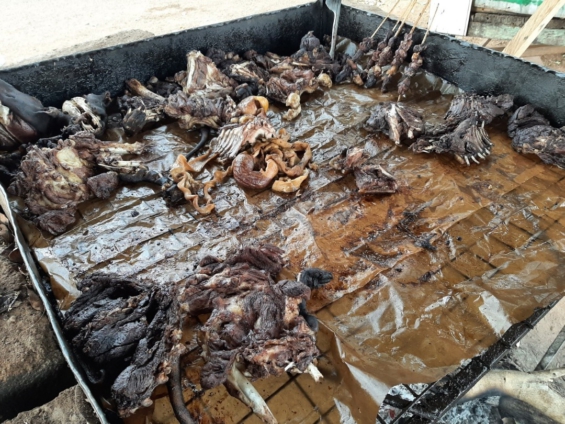A joint study by the University of Port Harcourt, Nigeria and the Kwame Nkrumah University of Science and Technology, Kumasi has unveiled alarming findings regarding the presence of cancer-causing substances in meats singed with different fuel sources.
The study published in the journal Environmental Health Insights has found that meats singed with tyres in Ghana contain high levels of harmful chemicals called polycyclic aromatic hydrocarbons (PAHs). These chemicals can increase the risk of cancer.
The study led by Prosper Manu Abdulai from the University of Port Harcourt tested meats singed with tyres, firewood, and LPG gas in Ghana’s five largest cities: Kumasi, Accra, Koforidua, Tamale, and Ho.
The researchers collected 180 samples of cattle and goat meat singed using three different fuel types: firewood, liquefied petroleum gas (LPG), and tyres.
They found that meats singed with tyres had the highest levels of PAHs, especially a dangerous chemical called Benzo[a]pyrene.
Children and older adults are more at risk from these chemicals.
“We did a health risk assessment and we realise that kids and adults who take this meat whether singed with firewood or tyre are at serious risk of getting cancer,” he warned.
The study recommends using safer methods like LPG gas for singeing meat and calls for stricter rules to prevent the use of tyres. This is especially concerning as the levels of this harmful substance in tyre-singed meats exceeded regulatory limits set by the European Food Safety Authority (EFSA).
The researchers call for the urgent need to explore and promote alternative singeing methods that minimise PAH formation.
LPG, which demonstrated the lowest PAH levels among the tested fuels, could be recommended as a safer alternative to traditional fuels like firewood and tyres.
Moreover, the study advocates for stricter regulations regarding the use of tyres for meat singeing, urging authorities to impose heavy penalties for non-compliance to protect public health and ensure that consumers are not exposed to harmful substances.
“The stakeholders should have something to do at the abattoirs so that all of them will use the LPG,” he recommended.
Latest Stories
-
T-bills auction: Government to borrow GH¢3.36bn on July 3, 2025
3 minutes -
Education system failure fuelling students indecent dressing – Wonder Madilo
5 minutes -
Telecel Ghana Foundation sweeps 4 honours at CSR & Sustainability Leadership Awards
13 minutes -
Passenger arrivals at KIA dip by 10.3% in first three months of 2025 – BoG
16 minutes -
Malta Guinness ignites a movement with the launch of it We Move campaign
24 minutes -
GSS launches national in-depth business data collection after nationwide training of field officers
27 minutes -
Engage Now Africa unveils new building for Ayagitam Primary School at Chiana
34 minutes -
Draft VAT reform to be ready by September 2025 – GRA
37 minutes -
Ablekuma North polls: Akua Afriyie rejects rerun
40 minutes -
Liverpool star Diogo Jota killed in car crash
41 minutes -
Dr Owusu Nyarko-Boateng: New data bundle price and its unlimited opportunities
48 minutes -
Recruitment into Ghana Armed Forces will be merit-based, not for cash – Defence Minister
59 minutes -
24-hour Economy: Labour laws to be revised to accomodate shift system – Haruna
1 hour -
GITW 2025: Experts call for smarter approach to infrastructure development
1 hour -
24-hour economy: GIPC Act to be revised to include strategic incentives – Haruna
1 hour

